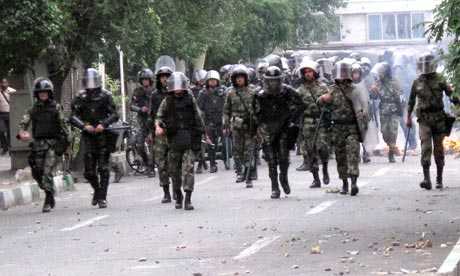Tehran pardons prisoners in effort to ease tense political atmosphere before parliamentary elections in March
Saeed Kamali Dehghan

Iran has pardoned 100 political prisoners in an attempt to appease the country’s opposition and reduce tensions seven months before parliamentary elections.
Iran’s supreme leader, Ayatollah Ali Khamenei, ordered the release from jail of a number of prisoners recommended to him by the head of the judiciary, Sadeq Larijani, to mark Eid al-Fitr, the Muslim festival at the end of the holy month of Ramadan.
Iranian media reported that almost 70 political prisoners out of the hundred had been freed in the past few days, and others had their sentences reduced or suspended. They are thought to have been arrested after Iran’s disputed presidential elections in 2009, but state news agencies described them as “prisoners convicted of security-related crimes”. Some agencies said other prisoners have also been granted clemency.
The semi-official Mehr news agency said: “Based on an agreement of the supreme leader, Ayatollah Ali Khamenei, 100 prisoners charged with security crimes have been granted amnesty. Some of them were involved in post-election sedition two years ago.” Iran describes the post-election unrest as a “sedition” orchestrated by foreign powers.
The mass release is the latest attempt by Iran to ease the country’s tense political atmosphere prior to parliamentary elections in March 2012. Authorities have recently given more space to opposition newspapers and have shown more restraint in dealing with criticism.
Etemaad, Arman, Roozegar and Shargh are newspapers sympathetic to the opposition and the reformist movement. Most were closed after the disputed elections but have resumed publication. Political activists are also reportedly enjoying more freedom in criticising the government of President Mahmoud Ahmadinejad.
Writing in opposition newspapers, reformists have welcomed the release of political prisoners, saying it was a “sigh of relief” for their families. In a column published in Roozegar, Nemat Ahmadi, a prominent lawyer, said the regime had refused to publish a full list of the prisoners and that many of those freed had not had a fair trial. According to Ahmadi, many prisoners have been illegally kept in jail without legal representation.
Some analysts claim Iran is giving ground to the opposition to avoid a repeat of the uprisings that have rocked the Middle East. In reformist newspapers, the extent of the criticism of Tehran’s support for Syria’s Bashar al-Assad appears to be unprecedented for Iran’s regime-sanctioned media.
However, human rights activists have expressed concern about opposition leaders Mir Hossein Mousavi and Mehdi Karroubi, who have been under house arrest since mid-February after calling for street protests in solidarity with uprisings in the Arab world. Mousavi and Karroubi have remained cut off from the outside world with little news about their health or daily activities.
The International Campaign for Human Rights in Iran, a US-based NGO, warned that Karroubi, 74, had been kept in complete isolation for more than 42 days. It said the former parliamentary speaker and presidential candidate has been under pressure “to appear in front of cameras and make televised ‘confessions’.”
Ardeshir Amir-Arjomand, a senior adviser to Mousavi, signalled that the opposition Green Movement will not take part in elections unless its leaders are freed.
www.guardian.co.uk, 30 August 2011

Leave a Reply